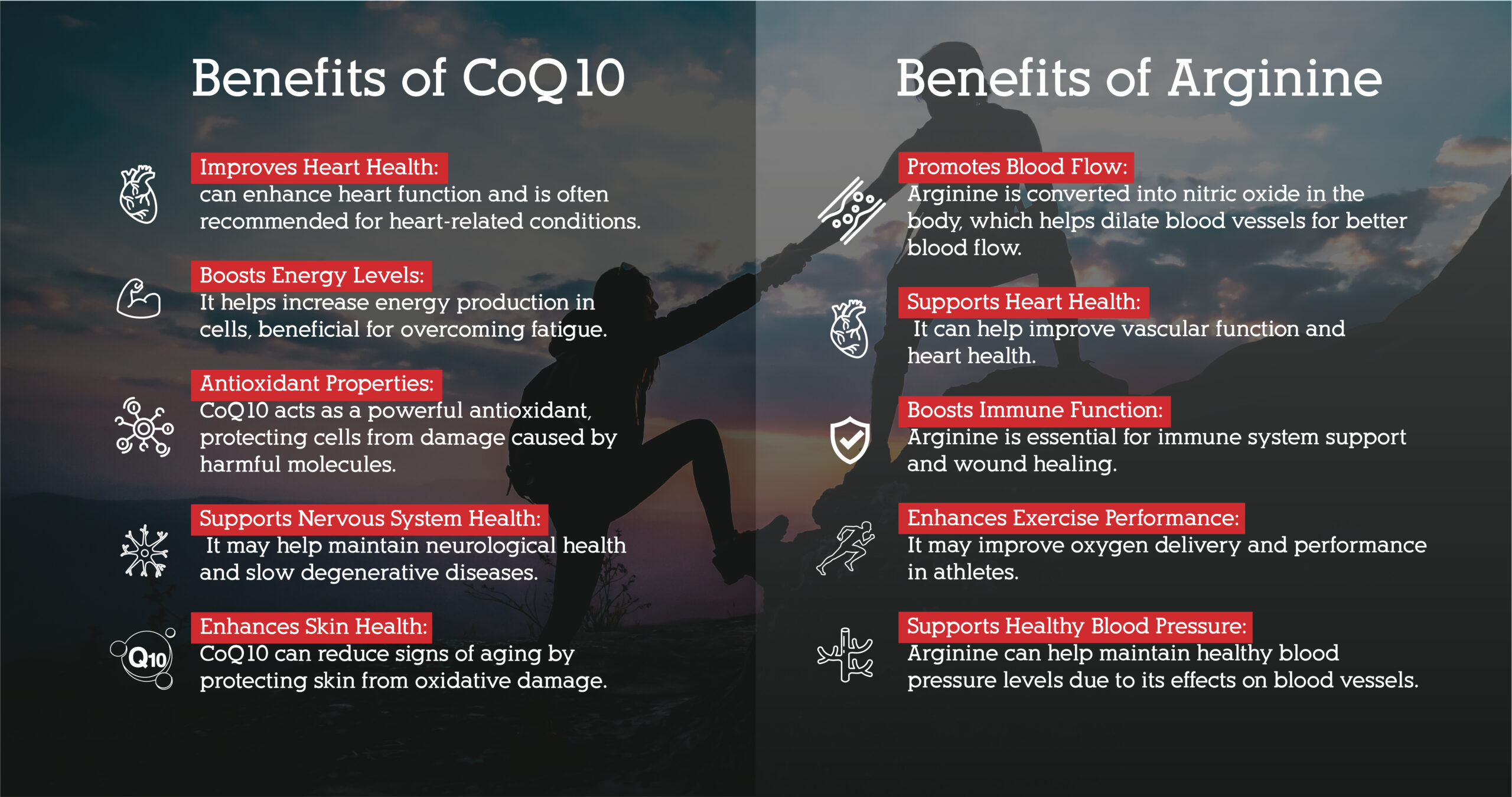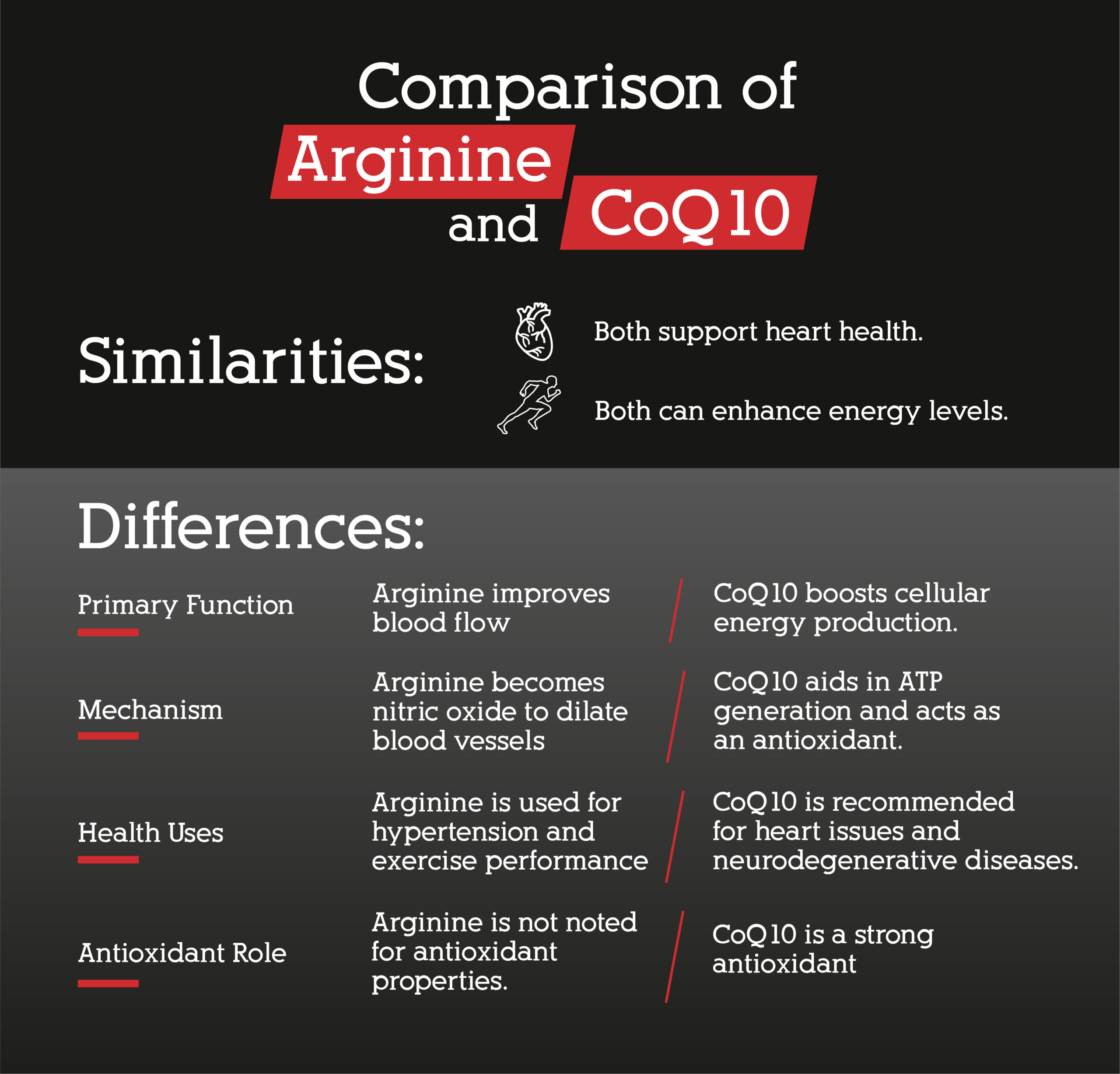Arginine Vs COQ10, which one wins in a match for the best blood pressure supplement? Let’s see!
When it comes to keeping our hearts healthy, understanding how to manage blood pressure is vital. After all, high blood pressure is a silent enemy that can lead to severe health issues without warning.
One of the most proactive steps we can take to protect our health is exploring natural supplements. Nature offers amazing nutrients that support cardiovascular health in various ways.
Arginine and CoQ10 are both well-known for supporting heart health. Both of these supplements offer promising benefits, but how do they work, and what makes them so effective? Are they the same, or does each one work differently?
Let’s get to the heart of the matter and discover how these supplements might be the friends your heart has been looking for.
COQ10 How does it work?
CoQ10, a key component in the Arginine vs CoQ10 discussion for heart health, works by energizing your cells and acting as an antioxidant. In every cell of your body, CoQ10 helps convert food into energy, which is vital for a healthy heart and muscle maintenance and helps maintain your energy levels.
Fun Fact:
Many people report a noticeable boost in their energy levels after taking CoQ10. It’s often described as feeling like having a switch has flipped on, powering them through their daily activities. This increase in energy is especially appreciated by those who lead busy lifestyles or need extra endurance throughout the day. CoQ10, by aiding in energy production at the cellular level, helps maintain a steady supply of get up and go, making it a popular choice for enhancing overall stamina and alertness.
As an antioxidant, CoQ10 also combats oxidative stress that affects cardiovascular health, helping to protect the heart and blood vessels from damage. This dual role makes CoQ10 essential for maintaining your heart cells’ energy production and defense systems. This is particularly important as we age or manage blood pressure issues.
How COQ10 Protects
CoQ10 protects cells by acting as a shield against oxidative stress. Think of your body as a city and your cells as buildings. Oxidative stress is like bad weather—such as pollution or too much sun—that can damage the structures over time. CoQ10 helps guard the cells, keeping this harmful weather from causing too much damage.
This protection is crucial because it helps keep the cells healthy and energetic. It is much like how a well-maintained building continues to function effectively for a long time. With CoQ10 around, your body’s cells are safer and can perform better for longer.

Why is COQ10 so effective?
CoQ10 is highly effective as a supplement. In the body, CoQ10 helps support healthy energy levels, which is essential for the functioning of all cells. This is particularly true in energy-demanding organs like the heart.
Research has shown CoQ10 to be particularly beneficial for heart health and cardiovascular issues. It may improve symptoms of heart failure and, in some studies, has been associated with a reduced risk of major adverse cardiovascular events.
This is because CoQ10 helps maintain the mitochondria, the powerhouses of cells, and protects against oxidative stress, which damages cellular components.
CoQ10 supplementation has been shown to potentially lower blood pressure and help manage statin-induced muscle pain, which are common issues for those with cardiovascular problems.
How is COQ10 Different From Arginine?
CoQ10 and Arginine are both popular supplements used for their cardiovascular benefits, but they function in distinct ways:
Source and Nature
CoQ10: Naturally produced in the body and found in foods like meat and fish. It is primarily used as an antioxidant.
Arginine: An amino acid obtained from dietary sources or supplements, crucial for the production of nitric oxide, a compound that relaxes blood vessels.
Primary Functions
CoQ10: Helps in energy production within cells and acts as an antioxidant, protecting cells from damage.
Arginine: Directly contributes to the production of nitric oxide, which helps dilate blood vessels for better blood flow.
Health Benefits
CoQ10: Supports heart health by improving energy production in heart cells and reducing oxidative stress. It may also help reduce the symptoms of conditions like heart failure and migraine headaches.
Arginine: Boosts nitric oxide levels in the blood, which can help lower blood pressure, improve circulation, and enhance athletic performance.
Usage in Medical Treatments
CoQ10: This supplement is often recommended for patients with heart conditions or those taking statins, which can lower natural CoQ10 levels in the body.
Arginine: Used to improve blood flow, which can be beneficial in treating conditions like clogged arteries, chest pain, and erectile dysfunction.

Arginine: How does it work?
Arginine, the other player in the Arginine vs CoQ10 debate, primarily functions by boosting nitric oxide production, a crucial compound that relaxes and widens blood vessels.
This process enhances blood flow throughout the body. It is essential for maintaining cardiovascular health and supporting efficient nutrient and oxygen delivery to various tissues. It can lower blood pressure, health the endothelium, and support many bodily functions.
Fun Fact:
People often report feeling more vibrant and noticing improved physical performance when incorporating Arginine into their supplement routines. This is largely due to the enhanced blood flow and oxygen delivery that Arginine facilitates, which is particularly beneficial during workouts or any activity requiring endurance and strength.
As a precursor to nitric oxide, Arginine plays a direct role in cardiovascular health by aiding vascular dilation, which can help reduce blood pressure levels and improve overall heart health. The ability to support nitric oxide production becomes increasingly important with age, as natural levels of nitric oxide production tend to decrease. This decrease can be from heavy metal toxicity.
How Arginine Protects
Arginine protects by enhancing the body’s natural ability to produce nitric oxide, which not only improves circulation but also supports the immune system and aids in the removal of ammonia, a waste product in the body. The increased blood flow can also help in delivering more nutrients and oxygen to vital organs, promoting healing and better overall health.
This protective mechanism is crucial for maintaining an efficient vascular system, much like how well-lubricated gears keep a machine running smoothly. With adequate levels of Arginine, your body’s ability to maintain optimal circulation is enhanced, supporting long-term health and vitality.
Why is arginine so effective?
Arginine is highly effective because it plays a crucial role in producing nitric oxide, a molecule vital for various bodily functions, particularly in cardiovascular health. Here’s how Arginine stands out:
- Boosts Nitric Oxide Production: Arginine is directly involved in synthesizing nitric oxide (NO). NO is a powerful neurotransmitter that helps blood vessels relax and improves circulation. This is essential for regulating blood flow and blood pressure.
- Supports Heart Health: Arginine enhances blood vessel relaxation and circulation, Which can help reduce blood pressure, which is beneficial for heart health. The increased NO production also helps prevent arterial plaque growth and blood clot formation.
- Improves Exercise Performance: Arginine is popular among today’s athletes because it is believed to improve blood flow, oxygen delivery to muscles, and exercise performance. This can result in increased endurance and reduced muscle fatigue. This use is totally safe and legal.
- Supports Immune Function: Arginine serves as a stimulant for the immune system. It has been shown to support the health of the body’s immune response, aiding in the healing and repair processes.
- Enhances Wound Healing: Arginine is also effective in wound healing due to its ability to improve blood flow. Enhanced circulation means more nutrients and oxygen can reach the wound area, speeding up healing.
The effectiveness of Arginine, especially in terms of cardiovascular support and enhanced physical performance, is backed by various studies and research, highlighting its role in promoting nitric oxide production and overall health benefits.

